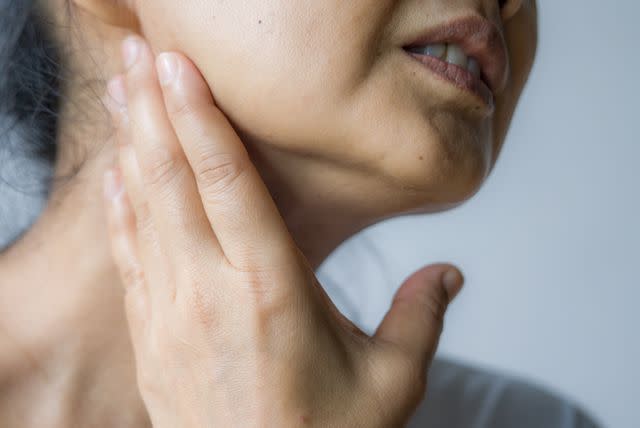Jaw Pain: Sometimes a Heart Attack Symptom
Medically reviewed by Christopher Lee, MD
Jaw pain is an often overlooked heart attack symptom. It is called "referred pain," meaning that it originates in a different part of the body. In the case of jaw pain as a heart attack symptom, the pain results from disrupted blood flow to the heart.
This article will review the more unusual symptoms of a heart attack—specifically jaw pain—and how to know when that jaw, neck, or tooth pain is a sign of a bigger problem.

athima tongloom / Getty Images
Related: Everything You Need to Know About a Heart Attack
Jaw Pain From Heart Attack
Jaw, neck, and back pain are typical heart attack symptoms, but they get less attention than chest pain. Neck and back aches are fairly generic symptoms that many people develop with age. You might experience chest, shoulder, neck, and jaw pain for many reasons, so it can be difficult to pinpoint their cause or the possible consequences.
An estimated 4 in 10 people who experience a heart attack report orofacial pain. Orofacial pain can include the jaw and other parts of the mouth or neck.
Jaw Pain: A Red Flag for Women?
Anyone can experience jaw pain with a heart attack, but females are more likely to notice jaw pain with or without other symptoms of acute coronary syndrome (ACS).
How It Feels
It can be challenging to tell the difference between tooth-related jaw pain and that caused by a cardiac emergency. People who experience jaw pain during a heart attack describe the pain as oppressive, burning, or crushing.
Side of Jaw
Jaw pain that occurs with a heart attack or other cardiac problems is called referred pain because it occurs in an area other than where it is actually felt.
Symptom Onset
Heart attack-associated jaw pain often occurs following physical exercise or stress, though it can happen at any time, not just following physical exertion. Up to 4% of people develop jaw pain with no other symptoms during a heart attack. Heart attacks that occur with jaw pain as the sole or primary symptom are more common in women than men.
Jaw pain related to a heart attack doesn't always come on suddenly. One study details a case in which a man experienced jaw pain for five years before seeking dental care, which ultimately led to a referral to a cardiologist and treatment for coronary artery disease.
Ongoing jaw pain may or may not be a sign of an immediate heart attack, but persistent pain may develop with other cardiac disorders.
Why Heart Attack and Jaw Pain Occur Together
A heart attack doesn't directly cause pain in your jaw. Instead, the pain that you feel in your jaw, mouth, and other areas of the head and neck is the result of a decrease in cardiac blood flow.
A heart attack disrupts blood flow to or through the heart, causing a lack of oxygen (ischemia), which creates noticeable symptoms like chest pain and shortness of breath.
Jaw or mouth pain isn't the first symptom you might think of for a heart attack, but it's common enough to take seriously—especially if you experience jaw pain alongside other symptoms such as sweating or shortness of breath.
Emergency Treatment for Jaw and Chest Pain
If you suspect you are having a heart attack, it's essential to get medical care as soon as possible by calling 911 or getting to your nearest emergency department.
If a healthcare provider identifies a heart attack as the cause of jaw pain, the order of priorities will be to clear the blockage in your heart, restore adequate blood flow, and prevent complications that can arise from decreased blood flow.
Read Next: What Are the Causes of Right-Side Chest Pain?
Rehabilitation After Heart Attack and Management
If you have a heart attack, cardiac rehab and heart-healthy changes will be a big part of your recovery. Cardiac rehabilitation programs are designed to help you understand the risk factors and preventive measures for heart health.
During cardiac rehabilitation, a healthcare provider will advise you on exercises to strengthen your heart without straining, how to make heart-healthy meals, and what treatments and medications can help prevent additional cardiac problems.
Call for Help With Jaw Pain and Cardiac Risk Factors
If you are experiencing sudden and aching jaw pain, don't ignore this symptom. While a dental emergency isn't out of the question, jaw pain is a common and often missed symptom of a heart attack. Call 911 or go to the hospital immediately if you are experiencing persistent jaw pain without a clear cause, regardless of whether other symptoms of a heart attack are present.
If you have already been diagnosed with cardiac problems like an arrhythmia, heart failure, or coronary artery disease, you may want to lower your threshold for seeking medical attention for symptoms like jaw or mouth pain.
Summary
Jaw pain is a known but often forgotten symptom of a heart attack that is caused by a lack of blood flow to the heart. It can happen to men or women, but jaw pain linked to a cardiac emergency is more common for females. If you have ongoing or sudden jaw pain—especially alongside chest pain or shortness of breath—seek immediate medical care.
Read the original article on Verywell Health.

